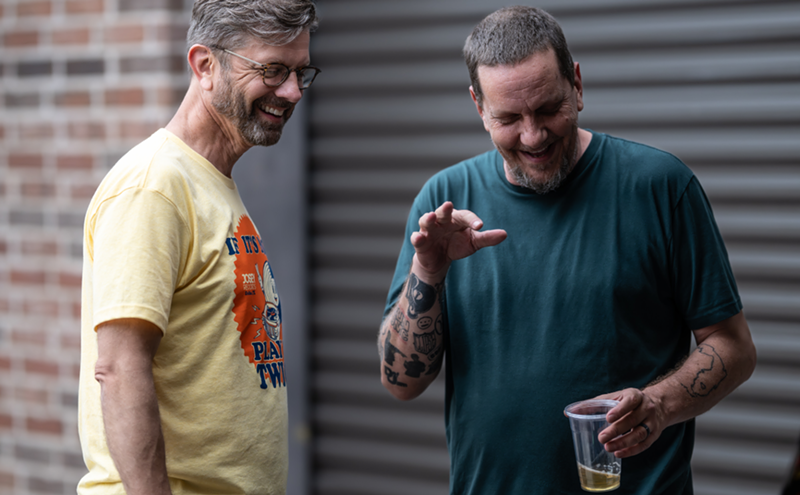Pick up a copy of Official Truth 101 Proof: The Inside Story of Pantera at any local bookstore or online at Amazon. Rex will be signing copies of the book at Barnes & Noble on Northwest Highway in Dallas on Tuesday night, March 19, at 7:00 p.m.
Back in the Nineties, Panetra rocked venue after venue, jamming with legendary bands such as Black Sabbath, Iron Maiden and Slayer. The Southern boys were known for their crushing Texas blues metal sound. Each mind-blowing show sent fans into a mosh pit that erupted bodies. Jack Daniels, Mexican cigarettes and strippers were after party condiments. Night after night, it was a Texas-sized party until the stress of touring and an overabundance of drugs and alcohol threatened to separate the band.
In July 1996, Pantera arrived in Dallas in support of The Great Southern Trendkill. It was hotter than hell outside. Excessive heat advisories scrolled across TV screens throughout the metro area. Sixty miles to the north, bikers prepared for the Hotter N Hell Hundred event. Nine elderly people died from the heat wave. The band's new album had just hit the airwaves in May and another grueling tour was under way.
After the show, it still felt like 118 degrees. It was one of those days where roadies dropped like dominoes as heat exhaustion descended on the weary crew. And it was the first explanation that came to drummer Vinnie Paul Abbot's mind as he watched lead singer Phil Anselmo turning five shades of blue on his dressing room floor. Bassist Rex Brown, however, knew better. Something weird had been going down in the singer's dressing room before the show. Strange glassy-eyed people lingering in the shadows. One guy in particular doing this "head shuffle thing."
When his sister called him after the show with the news of Phil's overdose, Rex wanted to "beat the living shit" out of him. A disc jockey had announced it earlier on the radio: "Philip Anselmo, singer with the rock band Pantera, has overdosed on heroin." The singer's dark secret was finally revealed.
In 2003, when Pantera disbanded, the metal community felt the rippling effect as Phil and the Abbot Brothers voiced their frustrations through various media outlets: "...aside from the other band which I ain't ever doin' nothin' with again," Phil said in an interview with Absolute Metal. "The next thing I know," Vinnie Paul said in a Revolver interview, "he's off doing DOWN with Rex and talking shit about us."
The media war that ensued rivaled Lennon and McCartney. Phil versus the Abbot Brothers. But as the gloves came off, Rex stood on the sidelines and watched his former bandmates, his friends, his family destroy each other with words and miscommunication. He never got involved. He stayed out of the press. Then one cold winter night a year later, a psychotic fan stopped the argument when he shot and killed Dimebag Darrel, who was touring with his and his brother's new band Damageplan.
It's been 10 years since Dime's death, and Rex is now ready to tell his side of the story and bring the final chapter to this metal band tragedy to a close in his new autobiography Official Truth: 101 Proof, The Inside Story of Pantera. "If it was up to me, it would have been a 1,000 pages long," Rex explains. "How do you put 20 years of your life in 300 pages? It's kind of hard to do."
Writing from the first person, Rex takes readers into the familiar world of the Rock Star, where rivers of whiskey flow like cash pouring into the band members' bank accounts. It's the turning point of Pantera's success. What the fuck are we going to do with it? is the question on the Southern boys' minds. "Dude, I've got more money than God" is some of the admittedly "stupid shit" Rex would say and think, although he would later learn that the road costs more than he ever expected. "We're still relevant in a certain sort of way; even though we hadn't been around in ten years because of the tragedy of Dime," Rex says in a recent phone interview. He's traveling to New Mexico for the first leg of his book tour. "I thought it was time to go ahead and get it off the chest, and there's nothing wrong with that either."
Rex, of course, isn't handling the writing duties alone. Mark Eglinton, a writer from Scotland, helps sharpen some of the sentences. "I wanted this to be in first person where it's me talking," Rex explains, "and this guy is from fucking Scotland. So going through that was another process." Although it was different than playing in a band, the process was no less demanding. There were ten different final manuscripts before one was finally chosen.
In Official Truth, Rex illustrates not only the band's evolution, Phil's addiction and Dimebag's death but also the bassist's life growing up in North Texas, his father's death and his eventual move to Arlington where he meets the Abbot Brothers in high school band. He soon quits but picks up another musical instrument. "There's too many fucking guitar players," he says, "so I just picked up the bass. It's been however fucking long... Thirty years now."
In his memoir, Rex reflects on his life before Pantera, and it's surprisingly ordinary. Skipping class, smoking grass, listening to rock & roll. It's a typical way of life for many rebellious teenagers across the Dallas/Fort Worth area in the '80s. Just look at every Hair Metal MTV video from that decade. Twisted Sister, Motley Crue, Ratt. All of them exemplified a Texas Stoner's lifestyle. In fact, the Beastie Boys said it best: "You've got to fight for your right to party."
From a musician's standpoint, reading about the band's composing of such hits as "I'm Broken," "Floods," "5 Minutes Alone" and "Cemetery Gates" was pure musical bliss, especially when the songs blasted through the headphones as the pages slowly turned. And fans who still live in the Dallas/Fort Worth area will enjoy traveling back in time when Rex discusses Pantera's early days playing at Joe's Garage and weekend gigs that sometimes turned into "week-long residences." In fact, the band's original singer Terry Glaze even makes an appearance in the book, dropping his thoughts between the text whenever the bassist talks about another episode from the band's early days.
And herein lies the only major complaint about the book.
Ignoring Rex's use of I, a word that plagues many writers today, is rather easy when you're used to grading hundreds of papers each week; after all he's not Ernest Hemingway; he's a bass player in a rock band. It's when Cheryl Pond's, Terry Glaze's, Rita Haney's, Walter O'Brien's, Terry Date's, Guy Skyes', Jeff Judd's, Kate Richardson's, Kim Zide Davis' and Belinda Brown's voices appear in the memoir, sliding between paragraphs like outsiders crashing a mental party.
It's jarring, to say the least. Old British writers used this technique in the days when overly wrought descriptions buried the story's meaning. Every so often 19th century readers needed a friendly reminder.
Today, the technique feels like the writer is suffering from a dissociative disorder when voices other than his (or her) own appear in the text. It threatens to break the story's illusion. In Official Truth, Rex and his Scottish writing partner no doubt are using the bassist's family, friends and coworkers as if they're supporting an argument. But as Rex says, "There's just four of us in the band who knew what was going on, and one of them isn't with us anymore. This is just my perspective of what went on." By including other people's voices, Rex (or the Scottish writer) is introducing other perspectives. It's like watching an episode of VH1's Behind the Music playing across the page, which would be okay if we didn't need transitions to help introduce or setup the block quotes where the voices appear.
Rex's memoir delivers to fans what the bassist intended: a behind the scenes look at the events that led to the downfall of one of America's greatest rock bands. It's full of conflict, raw emotion and backstage antics. Some of the bands turning points are illuminated in reflective detail, as if the musician turned author is telling you his story by a warm campfire while someone strums Pantera songs on an old acoustic guitar. As Rex says, "If y'all want a good book on fucking Pantera, here it is from a fucking insider who had really good fucking cheap seats."












